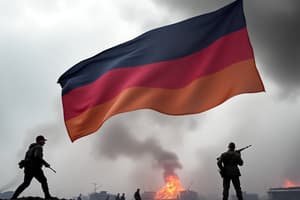Podcast
Questions and Answers
Who was the first President of the German Democratic Republic (GDR)?
Who was the first President of the German Democratic Republic (GDR)?
- Otto Grotewohl
- Kurt Schumacher
- Wilhelm Pieck (correct)
- Konrad Adenauer
What was the main focus of Konrad Adenauer's government in the early years of the Federal Republic of Germany?
What was the main focus of Konrad Adenauer's government in the early years of the Federal Republic of Germany?
- Industrialization and economic growth
- Reunification with East Germany
- Improving relations with the Soviet Union
- Rebuilding the country and integrating with Western Europe (correct)
What was the main economic challenge faced by the GDR?
What was the main economic challenge faced by the GDR?
- Rapid economic growth
- High levels of unemployment
- Industrialization and food shortages (correct)
- Lack of Western investment
Which of the following parties opposed Konrad Adenauer's policy of Western integration?
Which of the following parties opposed Konrad Adenauer's policy of Western integration?
What was the purpose of the Berlin Airlift?
What was the purpose of the Berlin Airlift?
What event in 1953 led to a broader uprising against the GDR government?
What event in 1953 led to a broader uprising against the GDR government?
What was the main purpose of the Berlin Wall?
What was the main purpose of the Berlin Wall?
Which of the following countries condemned the construction of the Berlin Wall?
Which of the following countries condemned the construction of the Berlin Wall?
Who visited West Berlin in 1963, reaffirming American support for the city and its people?
Who visited West Berlin in 1963, reaffirming American support for the city and its people?
What was the outcome of the 1953 uprising against the GDR government?
What was the outcome of the 1953 uprising against the GDR government?
Flashcards are hidden until you start studying
Study Notes
Early Years of the Federal Republic of Germany
- 1949: The first Bundestag was formed, with Konrad Adenauer as the Chancellor of Germany and Theodor Heuss as the President.
- Adenauer's government focused on rebuilding the country and integrating with Western Europe.
Establishing the DDR (GDR)
- 1949: The Soviet-occupied zone held elections, and the German Democratic Republic (GDR) was established.
- Wilhelm Pieck was the first President of the GDR, and Otto Grotewohl was the Minister-President.
Post-War Politics and Relations
- The SPD, led by Kurt Schumacher, opposed Adenauer's policy of Western integration, fearing it would hinder reunification.
- The Western allies supported Adenauer's government, while the Soviet Union supported the GDR.
Economy and Reconstruction
- The Marshall Plan aided West Germany's economic recovery, while the GDR received help from the Soviet Union.
- West Germany experienced rapid economic growth, while the GDR struggled with industrialization and food shortages.
Cold War and International Relations
- The Cold War intensified, with the Soviet Union and the United States engaging in a propaganda war.
- The Berlin Blockade and Airlift (1948-1949) tested the resolve of the Western powers, and the GDR was seen as a Soviet satellite state.
17th June 1953 Uprising
- Worker protests in East Berlin led to a broader uprising against the GDR government.
- Soviet tanks crushed the uprising, and thousands were arrested or fled to the West.
Border and Security
- The GDR began constructing the Berlin Wall in 1961 to prevent further defections to the West.
- The wall divided the city, with watchtowers, barbed wire, and raked gravel to prevent escape attempts.
International Reactions and Diplomacy
- The United States and its allies condemned the construction of the Berlin Wall.
- In 1963, U.S. President John F. Kennedy visited West Berlin, reaffirming American support for the city and its people.
Early Years of the Federal Republic of Germany
- In 1949, the first Bundestag was formed, with Konrad Adenauer as Chancellor and Theodor Heuss as President.
- Adenauer's government focused on rebuilding the country and integrating with Western Europe.
Establishing the DDR (GDR)
- In 1949, the Soviet-occupied zone held elections, establishing the German Democratic Republic (GDR).
- Wilhelm Pieck became the first President of the GDR, and Otto Grotewohl became the Minister-President.
Post-War Politics and Relations
- The SPD, led by Kurt Schumacher, opposed Adenauer's policy of Western integration, fearing it would hinder reunification.
- The Western allies supported Adenauer's government, while the Soviet Union supported the GDR.
Economy and Reconstruction
- The Marshall Plan aided West Germany's economic recovery, while the GDR received help from the Soviet Union.
- West Germany experienced rapid economic growth, while the GDR struggled with industrialization and food shortages.
Cold War and International Relations
- The Cold War intensified, with the Soviet Union and the United States engaging in a propaganda war.
- The Berlin Blockade and Airlift (1948-1949) tested the resolve of the Western powers, and the GDR was seen as a Soviet satellite state.
17th June 1953 Uprising
- Worker protests in East Berlin led to a broader uprising against the GDR government.
- Soviet tanks crushed the uprising, and thousands were arrested or fled to the West.
Border and Security
- The GDR began constructing the Berlin Wall in 1961 to prevent further defections to the West.
- The wall divided the city, featuring watchtowers, barbed wire, and raked gravel to prevent escape attempts.
International Reactions and Diplomacy
- The United States and its allies condemned the construction of the Berlin Wall.
- In 1963, U.S. President John F. Kennedy visited West Berlin, reaffirming American support for the city and its people.
Studying That Suits You
Use AI to generate personalized quizzes and flashcards to suit your learning preferences.




